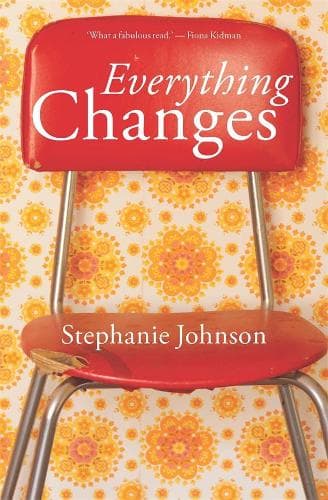Review: Everything Changes
Reviewed by Maggie Trapp
The hard-won, capacious love in Stephanie Johnson’s newest novel, Everything Changes, is an antidote to the last year—and, for that matter, to the last 30 or so years. It’s been clear for some time to anyone who cares to pay attention that the world as we know it is falling away, as are the scales from our collective eyes.
The world we once knew - the world we naively assumed we could pass on to our kids - has been radically altered with the future of the planet, and our place on it, in peril. It can be overwhelming to try to take in the looming fact of climate change, the terrifying reality of a pandemic, late-capitalism’s dismal outlook, and the deep political, racial and gender divisions evident in so many Western democracies right now. Yet amid it all, we still love, we still argue, we still care about what others think of us, we still try to forgive, we still return to remembered small, easily overlooked moments of grace—even while, as one of Johnson’s characters puts it, “the world’s ending and everyone’s fucked in the head so what’s the point.”
Johnson’s novel is the story of an Auckland couple who pull up stakes and decamp to Northland to open a retreat in a ramshackle old motel. The retreat is meant to be a readers’ haven, a place with no wifi, where guests are encouraged to get lost choosing from the shelves of secondhand books. We learn that the long-married couple’s bitter, pregnant daughter is staying at the retreat as well. An ex-con neighbour lands at the place to help with odd jobs.
The first gathering of guests includes a world-famous screenwriter in the mould of George R. R. Martin as well as a troubled anorexic daughter and her overbearing mother. This cast of characters exhibits all manner of neuroses, regrets, desires and surprising moments of connection. The through-line connecting these disparate personalities is the sense they have that they—and we—are living in end times.
We read lines like, “It’s because basically the world is ending. Nobody knows what to do about it, least of all me”, “Trying to find assurance that the world isn’t really ending. It has always been so—crazed men in power, poisons, epidemics, the plotting of unseen enemies, the blunt wrecking force of stupidity, all that,” and “Who am I kidding. The world will have ended. That downward, whirling, hopeless feeling again,” and we recognise our own falling-apart world.
Everything Changes is a story that is novel-like in scope yet is comprised of distinct threads. As with Catherine Robertson’s braided novel Gabriel’s Bay before it, Everything Changes opens with the story of a dog whose deeds and misdeeds are central to many of the characters in the book. We are thrust into the rowdy, rambunctious plot of this novel by hearing the dog’s first-person account. And each chapter that follows is an alternating first-person account from the ensemble cast that make up the rich story.
The atomistic feel of these chapters is part of the point of this novel. Each of these characters is in their own head. As readers, we have access to their true thoughts and feelings as we watch them navigate complex interpersonal hits and misses with other characters. The braided narrative makes it all the more poignant to witness each character attempting to translate their rich inner lives into halting communication with those around them.
These characters’ interactions with those they love are, in the end, often just so much shadow boxing. They talk around each other, skirting difficult feelings, shunting complicated connections. The novel is a crazy quilt of interwoven stories by means of which we come to root for these complicated, flawed, endearing characters as they fumble their way toward lasting connection in a world turned upside down.
Reviewed by Maggie Trapp
